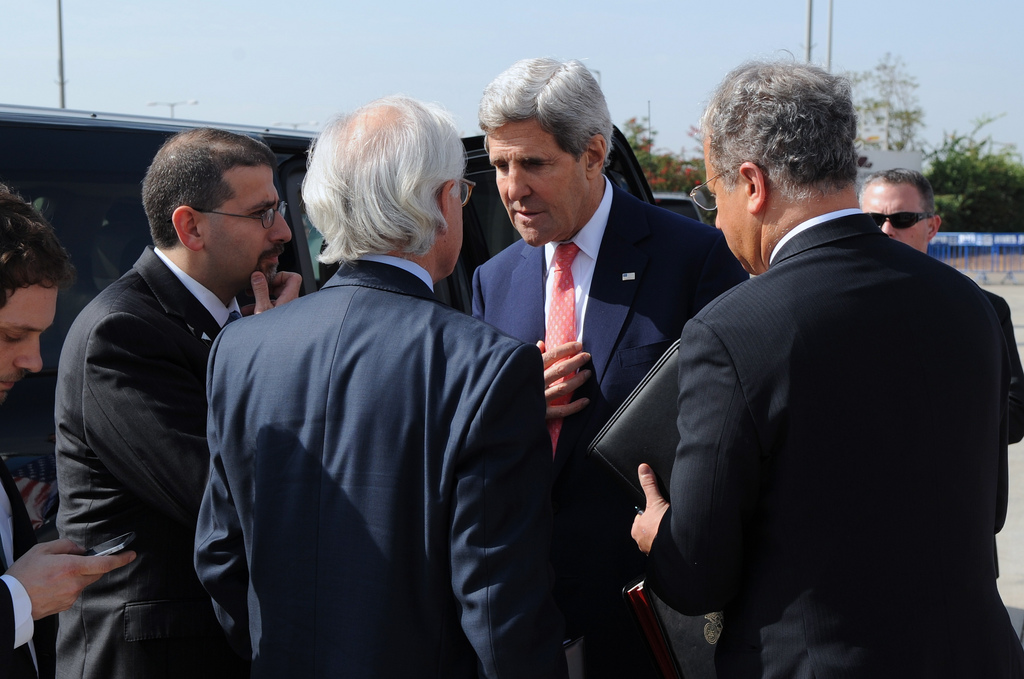Studies show that including women in peace negotiations improves chances of success.
by Eetta Prince-Gibson
As the non-negotiations sputter, it becomes clear that we are stuck once again in an opaque process where each side attempts to apportion geography based on narrowly defined concepts of security and sovereignty. Maybe it’s time to try something different.
More than a decade ago, Israel was the first United Nations member to pass legislation adopting UN Security Council Resolution 1325, which calls for including women in all levels of policy-making and peace-building. Sadly, Israel has consistently refused to uphold its-own law by not including women in peace process negotiations.
Of course, Israel’s current negotiating team is headed by a woman—Justice Minister Tzipi Livni. Although the government has been tight-lipped about the composition of the negotiating teams, we do know that Prime Minister Benjamin Netanyahu’s personal emissary to the negotiations is not Livni, but hard-nosed lawyer Yitzhak Molcho, who has been involved in failed processes in the past. In the current government, eight ministers are members of the diplomatic-security cabinet, and only one of them is a woman—again, Tzipi Livni.
Including women in negotiating teams is not “merely” an issue of women’s rights. Extensive research reveals that bringing women into peace processes improves the chances of success. According to the U.S.-based Institute for Inclusive Security, women played a significant role in negotiating the Darfur peace agreement, raising previously neglected issues such as food security. Likewise, although only two women participated in the formal negotiations to end the 36-year war in Guatemala, these two were instrumental in including gender-sensitive proposals and thus promoting more support for the agreements. (And indeed, the Institute recently published a report on how inclusive security approaches could be applied to the Arab-Israeli peace process.)
Research from the nonpartisan Woodrow Wilson International Center at the Smithsonian Institution suggests that women in peace negotiations tend to act as public servants instead of combatants and that they use distinctive sets of social skills. Why is this? Some would argue that women negotiate differently because they are innately more peaceful and less aggressive than men. Thinking about modern women leaders, from Golda Meir to Margaret Thatcher (with many in between and since), I find this unpersuasive. I don’t think that a womb is a substitute for a conscience or that estrogen inherently produces kinder human beings.
More likely, women alter negotiation outcomes because their experience of armed conflict is different from men’s. That fewer women die on the battlefield does not mean women do not live through war; it means that they bring different ideas to the peace-making table. Women in the traditional roles of nurturers and caregivers must solve the problems created by the conflict and, paradoxically, by proposed “peace plans.” “Inclusive security” is the idea that after a war, fundamental social changes are necessary to prevent renewed hostilities and control the inevitable “peace spoilers.” For peace to be sustainable, all of the stakeholders, including the most vulnerable, must feel safe. Viable peace plans must focus on changing hostile, fearful mindsets and take communities and social identity into account.
In 1997, after a helicopter collision killed 73 soldiers on their way to the security corridor north of the border with Lebanon, a small group of women organized the Four Mothers Movement to express their rage at the government that had reneged on its own promises to withdraw into Israel. None of these women held a military rank; none had traditional military expertise or had been decorated for heroism in combat. But they all had the courage to state that security must also include regard for the value of human life and that the safety of their sons was a legitimate political and security concern.
And they were widely seen as a key element in the turn in Israeli public opinion against maintaining combat ground forces in Lebanese territory. In 2000, under growing public pressure, the Israel Defense Forces withdrew from Lebanon. The security of Israel’s citizens in the north was not affected.
In Israel, the Four Mothers remain a singular example of women’s concrete influence on politics. Yet their intervention changed the way Israelis talk about war and peace. And they are far from the only women, there or worldwide, who have used non-traditional channels to work for peace.
Indeed, throughout the Israeli-Arab conflict, women excluded from the formal political process have been the mainstay of civil society efforts and grassroots initiatives, as well as a dominant force in mixed-gender groups such as Peace Now. There are dialogue groups like Emun (Trust) that seek to ease hostility through familiarity and even a group called Slim Peace, which encourages Israeli and Palestinian women to get to know one another through dieting. Women who lost loved ones to the conflict published a recipe book replete with the humor that helps both Palestinian and Israeli women to cope with their pain. There are more politically minded and strategically oriented groups like Woman-to-Woman and the Israeli Women’s Network for Peace, and the Deborah Forum, in which prominent women from the military, security and political establishment push for greater inclusion in those areas.
In October 2013, a coalition of Israeli women’s groups published a National Action Plan (NAP) for the Implementation of UN Security Council Resolution 1325. The NAP redefines the concept of security and offers five objectives, including equal representation of women from all sectors of society in decision-making bodies, national and local.
It’s a good starting point. By now, it’s self-evident that teams composed almost exclusively of élite military men who have fought against each other for years cannot create a sustainable peace. On both sides, the impact of the Israeli-Palestinian conflict has been sadly and cruelly inclusive. It is time that we take an inclusive approach to peace, too.
Eetta Prince-Gibson is the former editor-in-chief of The Jerusalem Report.




One thought on “Opinion // Give Peace—And Women—A Chance”